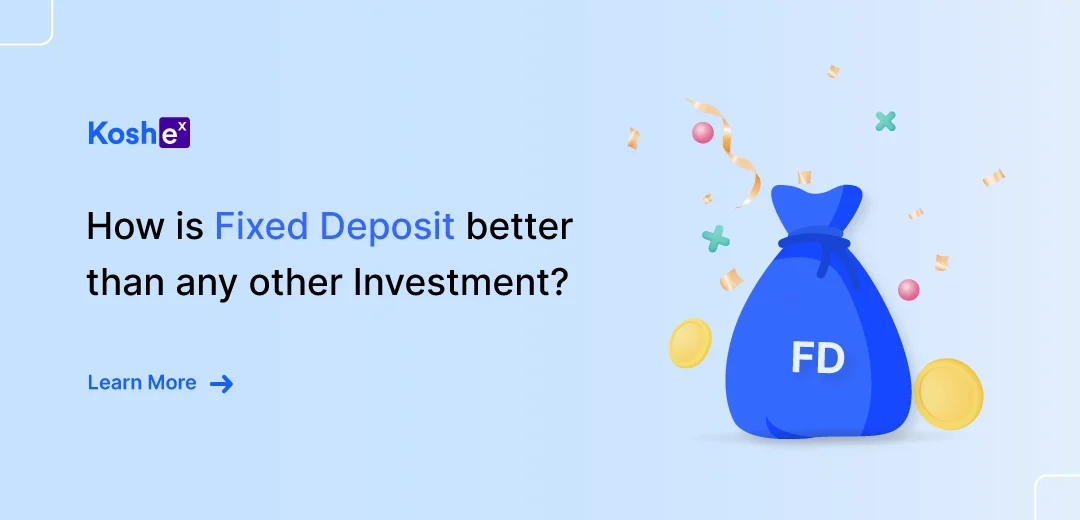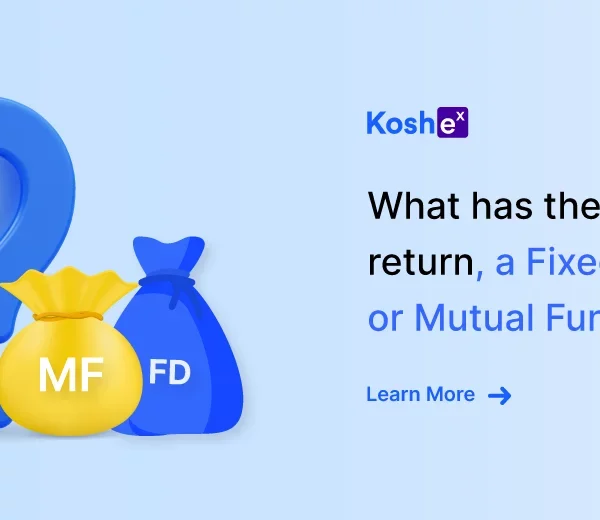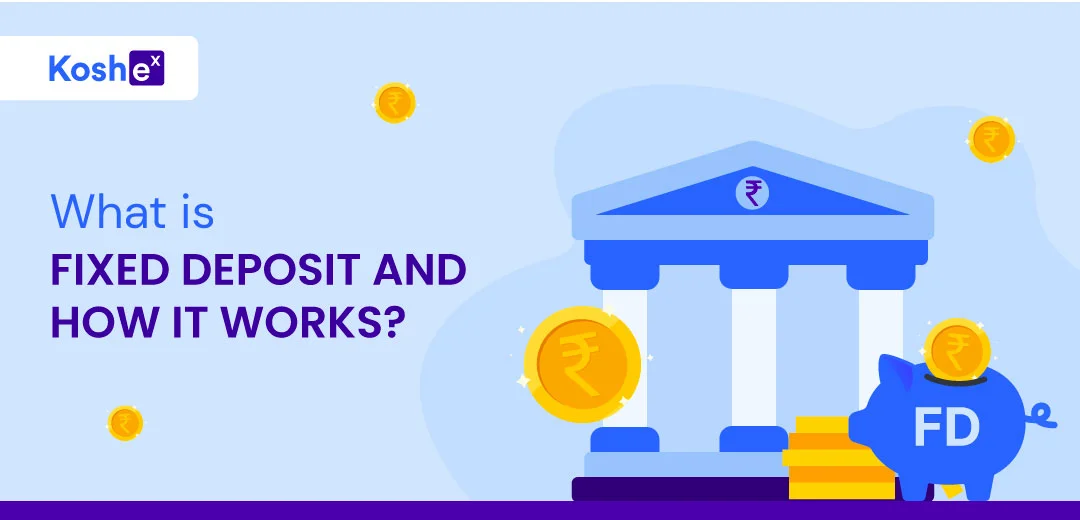Fixed deposits or FDs allow us to save funds at a fixed interest rate for a pre-determined tenure. The interest is compounded annually, depending on the plan. In other words, the interest gets added to the principal each year and earns interest in the subsequent year. Fixed deposit investments are generally long-term, with a specific lock-in period. The interest rate remains unchanged throughout the tenure. An FD, therefore, offers guaranteed returns.
Over 46 trillion Indian Rupees were held in fixed deposits by individual Indians in the 2020 fiscal year. Compared to the previous fiscal year, when the value of fixed deposit assets was only 44.18 trillion rupees, this was a significant growth.
So, what fuels the popularity of fixed deposit schemes? Why do people prefer them over other investment options? Let’s find out.
What is a Fixed Deposit?
A fixed deposit is an investment instrument where we invest our money in a bank or financial institution for a set period. The interest rate remains fixed for the entire tenure. Hence, fixed deposits offer assured returns.
Benefits of a Fixed Deposit
If we scan the market, mutual funds or ETFs offer higher returns than FDs. However, fixed deposits balance the odds by offering protection of capital. They are safe to invest in and provide assured returns. Now, let us look at the primary benefits of fixed deposits:
- Your investments up to Rs. 1.5 lakh are tax deductible under Section 80C of the Income Tax Act. This is only applicable only to tax-saving deposits.
- The deposits earn interest at a fixed rate for the entire tenure. Hence, the returns are guaranteed.
- You can use FD as collateral to secure loans or overdraft facilities. In this case, banks will charge interest on the fund withdrawn and not the entire sanctioned amount.
- FD loans come with attractive interest rates, typically 2-3% higher than the FD interest rate.
- You can choose your FD tenure when opening the account. The minimum term depends on the financial institution. Typically, it ranges from 7 days to 10 years.
- FDs are market agnostic. In other words, market volatility does not impact your fixed deposit. Hence, FDs are safer than market-linked investment options like mutual funds.
Types of Fixed Deposit Schemes
The FD returns depend primarily on the type of FD account we choose. We can divide FDs into several categories based on the mode of investing. However, regarding interest payouts, FDs come in two primary forms.
- Cumulative Deposits
In this case, the interest is compounded periodically. Under the compounding formula, the interest is reinvested annually and paid on maturity. In other words, the annual interest on your FD deposits earns interest yearly.
- Non-cumulative Deposits
In non-cumulative deposits, the interest is paid to you periodically. In this case, the interest is not compounded. You can choose the term of interest payouts – half-yearly, quarterly, or monthly.
Different Retirement Savings Schemes
FDs help you build a nest egg for your golden years. While not specifically a retirement scheme, many people use FD to create a post-retirement corpus. Let’s explore other retirement investment options available to see how a fixed deposit compares.
- Senior Citizens Savings Scheme (SCSS)
The Senior Citizens Savings Scheme is a retirement savings program. The Government of India backs it. The scheme allows senior citizens to invest individually or jointly, thus giving them access to regular income. Post offices and several banks offer SCSS facilities. Depositors can invest between Rs. 1000 and Rs. 15 lakh in the SCSS.
- Public Provident Fund (PPF)
Public Provident Fund is an investment instrument that allows users to deposit a lump sum at regular intervals (annually) and enjoy stable and relatively low-risk returns. The interest is compounded annually. Hence, PPF returns can be substantial on maturity, depending on the investment amount.
- Recurring Deposit (RD)
Like the FD, an RD is a bank, post office, or NBFC deposit that offers fixed returns for the entire tenure. We can deposit in RD every month. For best results, set up a standing instruction for deposit auto-debit every month from your savings account to the RD account. An RD helps inculcate a savings habit and is ideal for beginners.
Top 4 Advantages of a Fixed Deposit
How do fixed deposits rank over other investment options? Let’s find out.
- Safety
Fixed deposits guarantee the protection of capital. Unlike market-linked instruments, fixed deposits do not depend on market trends and are untouched by market volatility.
- Assured Returns
Fixed deposit interest rates will not change till maturity. Your deposits will earn returns at the same interest rate for the entire tenure.
- Loan Against a Fixed Deposit
One great feature of fixed deposits is that you can use them as collateral for loans. Moreover, these FD loans come with competitive interest rates.
- Flexibility
While you cannot typically liquidate FD before maturity, early withdrawal is allowed in many cases. Most FD accounts offer premature withdrawal without penalty, so you can access your funds at your convenience.
Conclusion
A fixed deposit is considered a safe and reliable method for investing your money. This reliability stems from the fact that the Government backs FDs. Moreover, they are not market-linked. So, the risk of losing your capital is near zero.
Additionally, FDs tend to offer higher interest rates than savings bank accounts. Hence, investing in FD is much wiser than parking your money in a bank account. The interest rates on FDs vary from one financial institution to the other. Since the profit from FD is in the form of interest, we must compare interest rates. It is pertinent to note that senior citizens enjoy higher interest rates than regular depositors.
FDs are ideal for risk-averse investors looking at investing for the long term. With no market linkage, FDs are safe for the entire duration. While mutual funds and ETFs may offer better returns, FDs are comparatively safer.
It’s best to assess liquidity needs and investment objectives before investing in a fixed deposit scheme. Safety of capital and guaranteed returns differentiate FDs from other investment options.
Sign up with Koshex and choose a fixed deposit that fits your financial requirements.
FAQs
How is a fixed deposit better than any other investment option?
A fixed deposit is often considered the safest investment option because it provides competitive returns without risk. Therefore, many find it better than any other investment option.
Why do people prefer fixed deposits?
A fixed deposit is a perfect option for many people. It helps you save your money for a long time and earn interest on it.









Leave a Comment